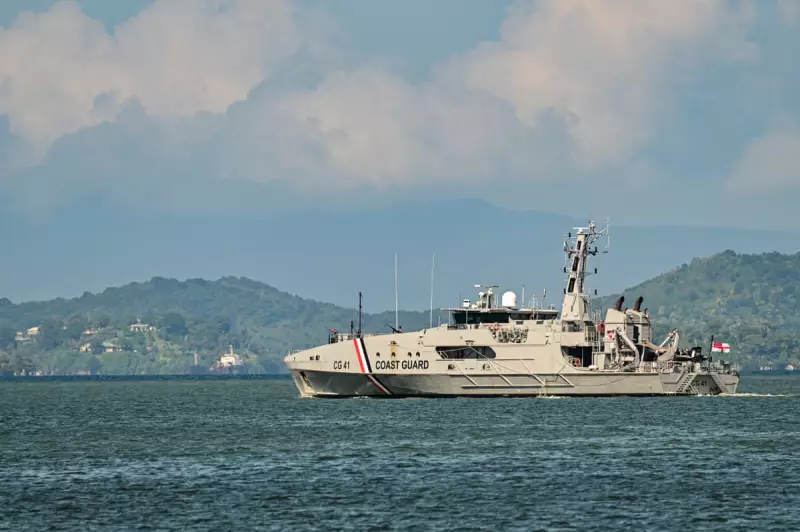
The United States is rapidly escalating its military posture in the Caribbean, with a former top diplomat now warning that an attack on Venezuelan soil is highly likely. James Story, Washington's ambassador to Venezuela from 2018 to 2023, has dramatically revised his assessment, stating he is now 80% sure military action will occur.
From Bluff to Imminent Threat
When Donald Trump initiated a major military buildup in August, deploying warships, marines, and Reaper drones to pressure Venezuelan president Nicolás Maduro, many observers believed it was largely a tactical display. However, the recent deployment of the USS Gerald R Ford aircraft carrier strike group – the world's largest warship – alongside continued airstrikes on alleged narco-boats has fundamentally altered the calculus.
"Facts on the ground have changed tremendously," Story confirmed, as the US engages in its largest military buildup in Latin America in decades. His perspective has shifted radically from two months ago, when he gave only a 10% chance of a US attack on Venezuelan soil. Now, he believes action is "imminent, without a doubt," with just a 20% chance the status quo prevails.
Maduro's Brave Face Amid Growing Pressure
Venezuelan leader Nicolás Maduro, a political survivor who has weathered numerous crises since 2013, has attempted to project confidence. "I'm more famous than Taylor Swift … I'm more famous than Bad Bunny! I even feel like recording an album!" the 62-year-old heir to Hugo Chávez joked recently.
Yet those familiar with the former union leader believe he is genuinely feeling the heat, despite previously overcoming assassination attempts, mass protests, economic collapse, and punishing sanctions. Andrés Izarra, a former Chávez minister now in exile, suggested: "I think he is nervous … None of [the top leaders] are relaxed … They see a real threat to their lives … Maduro is probably sleeping in one of those bunkers that Chávez built."
Spectre of Conflict and Diplomatic Gambits
While few anticipate a full-scale Panama-style invasion reminiscent of the 1989 operation that toppled Manuel Noriega, the deployment includes the same special forces helicopter unit used in that mission. The official US justification targets what it calls a "narco-terrorist" drug cartel allegedly run by Maduro.
Benjamin Gedan, director of the Latin America programme at the Stimson Centre in Washington, described the situation as exceptionally volatile. "We are both on the verge of war and on the verge of total normalisation of diplomatic ties. You would almost never say that about any conflict," he observed.
Gedan speculated that Trump's deployment could be an elaborate 'psyop' designed to frighten Maduro into resignation or exile, or to provoke a palace coup without firing a shot. Back-channel negotiations between the two nations are widely believed to have continued, despite public posturing.
Potential Scenarios and Regional Fallout
Story suggested one likely approach would be a "Soleimani-style attack" targeting one of Maduro's closest political allies, similar to the 2020 drone strike that killed Iran's Qassem Soleimani. Alternatively, the US could execute a devastating aerial blitz. "In just a couple of hours we could take out their air force, their navy, their surface-to-air missile systems and we could decapitate the government very quickly with what we [have] in theatre," Story claimed.
Venezuelan opposition leader Maria Corina Machado, living in hiding since what her movement claims was a stolen election, told Bloomberg her team had prepared for Maduro's fall. "We are ready to take over government. We have the teams, we have the plans – the first 100 hours, the first 100 days," she said.
However, experts warn of catastrophic consequences. Elías Ferrer of Orinoco Research pointed to the potential for a "Libya scenario," where the country descends into civil war following regime change. He also highlighted the risk of a prolonged insurgency similar to Colombia's decades-long conflict with guerrilla groups, noting many Venezuelan regions already resemble "the wild west."
Gedan cautioned that Venezuela hawks hoping for a repeat of the 1989 Panama invasion should instead study the US's 20-year quagmire in Afghanistan. "The reality is that [Venezuela] has a lot more in common with Afghanistan than with Panama," he warned, adding that toppling Maduro would be complex and rebuilding the nation enormously challenging.
As the USS Gravely was escorted from Port of Spain by the Trinidad and Tobago coast guard on 30 October 2025, the region holds its breath, awaiting the next move from an unpredictable US president in a gamble that could reshape Latin America.





